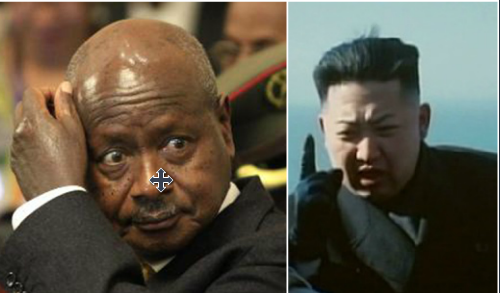For decades, Uganda could count on North Korea as a loyal ally despite the erratic behavior of the ruling Kim dynasty. Kampala in its poverty held its tongue, even as North Korea engaged in saber rattling, nuclear testing and bombastic threats.
But by this week, things may have gone too far, with the Ambassador of the Democratic Republic of North Korea (DRNK), Mr Myong Kyong Chol announcing that all North Korean security instructors who have been training Ugandan forces will leave the country by the end of this year, Daily Monitor quoted the diplomat.
Instructors from North Korea have been in Uganda for as long as Museveni has been in power, training its police in weapons use and in other areas, including teaching martial arts to troops. Uganda was also believed to be a crucial buyer of rifles and other small arms from North Korea.
“Frankly speaking, Our military and police cooperation will expire this year and it is very natural for the personnel of the DRNK to leave the country,” revealed Mr Chol, speaking to journalists at the North Korean Embassy in Kololo on Friday.
“We have been here on a mutual arrangement but now, we are taking a break. If the Uganda government wants us to continue, we will continue.”
This website understands that Uganda asked around 60 North Korean military advisers and state security officials to leave the country.
This new statement now answers questions about precisely when Kampala is ending contracted military cooperation in the Democratic Republic of North Korea.
Mr Chol, however, showed disappointment that their arch-rival, South Korea. Museveni’s son Major General Muhoozi Kainerugaba in November 2016 held discussions on military cooperation and training in special operations with senior Republic of Korea military officials in Seoul, in anticipation of kicking away the North Koreans.
A June 7 Ugandan sanctions implementation declaration revealed a contract outlining North Korea’s provision “of training to pilots and technicians of the Uganda Peoples’ Defence Forces” until March 20 2018.
The two nations’ air forces share a number of aircraft types, including the Mi-24/25 attack helicopter and the MiG-21 fighter jet.
TheUgandan had a week ago broken the news about how Uganda’s Foreign Affairs Ministry has told two top universities, government-run Kyambogo University and private institution Kampala International University to sack their industrious North Korean lecturers to appease the West.
Mr. Kutesa, a brother-in-law of President Museveni last month said that Uganda, following the UN sanctions, against N. Korea had disengaged relations with N. Korea over nuclear weapons. In March, the UN Security Council imposed sanctions on N. Korea after it launched ballistic missiles. The sanctions prohibit all UN member states from engaging with embargoed states in activities such as trade or transfer of technology.
North Korean trainers have helped militarize the supposedly civilian Uganda Police Force since 2007 under Gen. Kale Kayihura while it has been longer with the region’s most dreaded army, Uganda People’s Defence Forces – two major components that have facilitated Museveni’s three-decade rule. Uganda and North Korea have been renewing their military and police cooperation agreements after every six months but noted that there was no hope for a new deal.
To be sure, there is good reason to question Kampala’s sincerity in implementing these new sanctions. Despite Museveni having said he had no problem with the reclusive nation, much criticised by the West over its democratic credentials, Uganda’s track record on sanctions enforcement against North Korea has been spotty.
“There are people who are not happy with them, but I have not seen any problem with them. “They trained our first tank crew. They have also trained Special Forces,” the President said in April 2014 at the Kabalye Police Training School in Masindi District.

Mr. Museveni, in power since 1986, visited North Korea in 1987, 1990 and 1992 and met with Kim Il-sung. When he visited South Korea in 2013, he surprised officials by greeting them in Korean; he said he had learned it from Kim Il-sung, the South Korean news agency Yonhap reported.
For decades, South Korea and North Korea have tried to undercut each other’s influence in Africa.
Ofcourse, North Korea has slowly been cut off from its sources of hard currency so selling low-tech weapons to Uganda was a good way of keeping the cash flowing,” a military spy said. “And when one considers however many millions the Ugandans might have been paying them, to have that taken away is probably quite a significant blow to a poor nation like North Korea.”
In a winning shot, South Korea has won over Uganda.











